The Master's Edge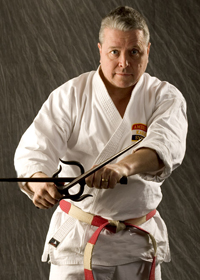
Frederic A. Reinecke
. . .
9th Dan AKS Chief Instructor |
|
|||||||||||||||||||||||||||||||||||||||||||||||||||||||||||||||||||||||||||||||||||||||||||||||||||||||||||||
A Little Wisdom
. . . |
The Rewards of Special Needs Studentsby E. Jude Gore 7th Dan 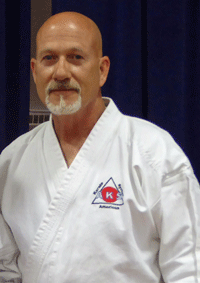
In a perfect world, every student in your karate class would be a star athlete, flexible as a ballerina, sharp as a tack, have reflexes like a cat, the memory of an elephant, with an eagerness to learn and undeterred determination. Just like I was when I started training ... okay, that is a "really bad" example?? Back to reality. That is not the way God made us. We all have strengths and weaknesses; otherwise, life would be pretty boring if we were all the same. An instructor must be careful not to predetermine or assume how a student will do by the abilities they possess or lack. Much of my teaching methods and philosophies come from teaching band and orchestra for thirty years. My goal for the first couple of years of teaching was to produce a band second to none. It was difficult and stressful, not only for me, but for my students. Not until I was enlightened by my former teacher and friend, Phil Rossano, did I understand what teaching was all about, and how to go about it. First, I had to understand that students are all different. They all learn and progress in different ways and at different rates. He relayed to me a story of a young clarinet player that did not go to his school, but asked to take private lessons. The student was not very good and couldn't play in time if his life depended on it. Each week he would show up for his lesson, but never made any progress. After a year, he told the boy's mother that he was a nice boy, but she was wasting her money. The mother said that she knew that he wasn't very good, but he really enjoyed the lessons and would he please keep giving them even though he may never get any better. Phil agreed.
Another year went by and still no progress, but he showed up each week on time and did his best. The following year to Phil's surprise, or dismay, guess who transferred into his school as a freshman and joined band? Yep! Phil had a large band and the boy sat last chair in his clarinet section. All the while, he kept coming weekly for his clarinet lesson. Over the next year, Phil noticed that he was gradually getting a little better and actually moved up several seats in his band. By his sophomore year, he moved up to the upper half of the section. Then came his junior year, and the boy asked if he could tryout for the All State Band. Each year the best students from the state audition to make this band. Only the best of the best make it. Phil informed him that he would help him prepare, but not to be disappointed if he did not make it. Many fine players tryout and don't make this band. When the results came back, Phil was surprised to see the boy missed making the band by only one place. I am sure you can figure what happened the boy's senior year. He became first chair in his high school band and also was awarded first chair in the All State Band. Not only did he make first chair in the All State Band, but was one of only a few to be selected to play a solo in the Honors Recital at the State Music Educators' Convention. The second thing Phil taught me was that the students weren't there for me, but I was there for the students. He told me to take some note cards and put each student's name on one and stick them in my shirt pocket. Every time I talked to a student about anything but band, I was to put a check mark on their card. He told me that, if a student was thinking about dropping out, I would find that their card had no or very few check marks. He was right. My focus changed to the welfare of each student instead of a superior performing group. To my surprise, band became more fun for me as well as for the students, and our ratings and number went up and not down. It is the same way with teaching karate. Students don't have to come to you for karate, they choose to. Now let's consider the "Special Needs" students in our karate classes. Special Needs is defined as "the educational requirements of pupils or students suffering from any of a wide range of physical disabilities, medical conditions, intellectual difficulties, or emotional problems, including deafness, blindness, dyslexia, learning difficulties, and behavioral problems." Is karate for them? Absolutely! In fact, it may be more important for them than the "star athlete" we all think we want our classes filled with. Remember, they have selected us as a teacher. It is now our responsibility to find a way to help those students become the best version of themselves. It may take them more time. We may have to do extra research and try to find different ways of teaching for them. We may have to adapt new techniques. We may get very frustrated and discouraged, but if they are willing to keep showing up and trying, then we must be just as willing, along with being patient and encouraging. We cannot preconceive what these students can accomplish. Remember the clarinet player. Once we have opened our minds to receiving these students, we need to also realize that this type of activity can be very beneficial to them as well as to everyone else. Aside from the physicality of karate; such as being active, improving coordination, good posture, and reaction skills, they also learn how to listen and focus while following instructions, improving confidence and social interaction by learning to work well with others, self-control and good decision making. By learning self-discipline and social awareness, they learn how to be responsible and respectful. All of this works toward a self-awareness and self-confidence that some people have trouble achieving. Of course, there are so many things we learn in karate class that are not mentioned here, but it is easy to forget that besides just teaching techniques, self-defense, and kata, we are helping them learn how to be the best person they can be. I would be negligent not to mention the question of rank for some of these students. I know many of you are thinking, "But some of them just will never to able to make Black Belt." Maybe or maybe not. Here is where I may step on some toes (that would be a stomp kick, right?). I will apologize in advance. The older I get, the less I value rank. I see so many black belts and some brown belts (and a couple of other colors too) that are so far superior to me with what they have accomplished. On the other hand, there are many high-ranking black belts that I have very little respect for due to their attitudes of superiority and lack of humility. Remember what Tadashi Yamashita would say at black belt shows . . . "You're a good student." I have found that there is a great joy in seeing these students progress. Yes, they may not be able to perform as well as others in the same rank. But in my eyes, they have persevered and are winners. There is nothing better than seeing the look of accomplishment and happiness in their eyes when they receive their new belt. It shows them that, despite their difficulties, with hard work and determination they can accomplish the goals they once thought beyond their reach. You may come to find that you needed them as much as they needed you.
|
|||||||||||||||||||||||||||||||||||||||||||||||||||||||||||||||||||||||||||||||||||||||||||||||||||||||||||||
Life In The Dojo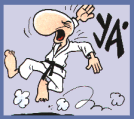
. . . |
Karate Termsby Dave Thomas 8th Dan 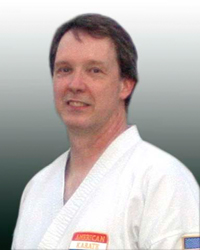
We frequently use a number of terms as we teach, but seldom define them for our newer students. "You need to work on your focus," students are often told, but explaining what constitutes focus is passed over. Typically, students often will not ask their instructors to clarify the terms used because they think they should already know the context we are using them in. As we progress in rank and experience, the terms become self-evident. For the new student, explaining these terms along with the training may be in order. I have listed some of the most commonly used terms that we use in training and tried to offer definitions that will help the student better understand what it is we want them to accomplish. Balance - the dictionary defines balance as an equal distribution of weight allowing one to be upright or stable, or a condition where different elements are in equal or correct proportion. In karate, we talk about the importance of balance in regard to not over extending and putting yourself at risk of being taken advantage of. We also strive to create balance between the use of our hands and feet as well as left and right. There is also balance in the way we conduct our lives; equal time for work and play, exercise and rest, etc. Proper balance is critical to the martial artist. Power - (mass x velocity = power). When I first started taking classes, the high ranks would always tell me, "More power." At the time, I truly had no clue what they were expecting me to do. I went through the motions until Mr. Lieb explained, "Throw your punch or kick like you're driving it through a wall." OH! Now I get it. More power means execution with great force. Focus - One of the most used terms in karate training. We use it, you hear it in movies, in training books and films; martial artists have to learn to focus to be successful. The best definition I have learned is, "A time of absolute clarity, total concentration." No distractions, no interruptions. I think kata training is the best method for developing focus; to stay on task in performance of a form is the best training. Control - Physical control is delivering a technique with enough speed and power to cause injury to an opponent, and then intentionally stopping short or limiting the amount of contact. Control is critical in teaching martial arts. Without control, we would have training injuries to the point we would have no students. Control also means emotional control. Mr. Lieb demanded that, when we would compete, we be good sportsman; win or lose. I have seen him "counsel" students who let their behavior get out of control. He said, "You must keep your emotions in check and use that energy in your techniques to beat your opponent." Confidence - We tell our students that as they train they will gain confidence. As instructors, we see the growth and maturity in every student that stays with us. In the beginning, they may not comprehend that in the process of training they will build a base of skills that allows them to understand they have the ability use the skills they have been taught. Physical skills transcend into intellectual discipline. One day during lunch, Mr. Lieb told me how impressed he was that I had built a business from a cold start-up to a successful industrial company. I told him that, honestly, that was easy. The hardest thing I had ever done was earn my Black Belt. Once I did that, I knew I could accomplish anything I worked hard at. Karate gave me that confidence. Respect - Here is term we throw around a lot. Unfortunately, it is harder to live up to than talk about. We demand respect on the floor in order to teach techniques that could cause serious injury. American Karate has always required that respect be reciprocated. I call six year olds, Mister or Miss. Where the respect sometimes falls short is when our rank or authority are challenged. I remember a visitor coming to my class and telling the parents of my students all the things he thought I was doing wrong. I didn't know the young man, nor had he bothered to introduce himself. But several weeks later we fought at a tournament. His lack of courtesy and respect was incentive enough for me to leave with first place. I think respect requires constant maintenance. Humility - A quality on how we are to conduct ourselves, "Be humble, and let your skills speak for you." When someone challenges you to fight, it is difficult to smile and walk away. But this is what we tell our students every time we practice self-defense, "Fight when you have no other option." This is when confidence and emotional control step forward, "You don't have to prove anything." As you get older, it gets easier to avoid a physical altercation; too much to lose. Honor - This is another term that is frequently used in our training. Honor is a code of conduct that encompasses integrity, discipline and humility. To the ancient samurai, honor was more important than life itself. As modern day martial artists, we maintain with reverence many of the traditions from the ancient warriors. Today we demonstrate honor by conducting ourselves with quiet dignity. |
|||||||||||||||||||||||||||||||||||||||||||||||||||||||||||||||||||||||||||||||||||||||||||||||||||||||||||||
Promotions
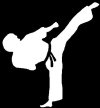
. . . |
Following are the current quarterly promotions for each club.
|
|||||||||||||||||||||||||||||||||||||||||||||||||||||||||||||||||||||||||||||||||||||||||||||||||||||||||||||
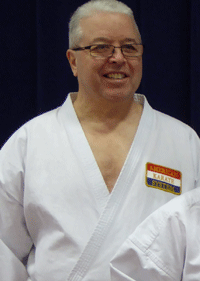
Frederic A. Reinecke 9th Dan Chief Instructor |
| |||||||||||||||||||||||||||||||||||||||||||||||||||||||||||||||||||||||||||||||||||||||||||||||||||||||||||||

Dave Thomas 8th Dan Chief Instructor Muskegon Karate Club |
| |||||||||||||||||||||||||||||||||||||||||||||||||||||||||||||||||||||||||||||||||||||||||||||||||||||||||||||
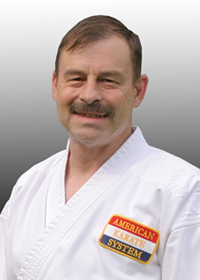
John Folsom 8th Dan Chief Instructor Salem Karate Club |
| |||||||||||||||||||||||||||||||||||||||||||||||||||||||||||||||||||||||||||||||||||||||||||||||||||||||||||||
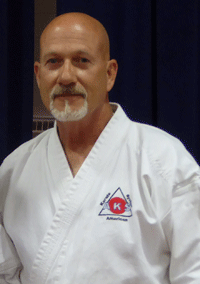
E. Jude Gore 7th Dan Chief Instructor Mountaineer Karate Club |
| |||||||||||||||||||||||||||||||||||||||||||||||||||||||||||||||||||||||||||||||||||||||||||||||||||||||||||||
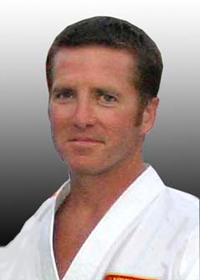
Rand (Skip) Palmer 6th Dan Chief Instructor West Toledo YMCA Karate & Self-Defense Program |
| |||||||||||||||||||||||||||||||||||||||||||||||||||||||||||||||||||||||||||||||||||||||||||||||||||||||||||||

John Talbot 1st Dan Instructor Tri-Cities Family YMCA AKS Karate Club |
| |||||||||||||||||||||||||||||||||||||||||||||||||||||||||||||||||||||||||||||||||||||||||||||||||||||||||||||
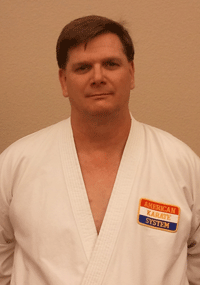
Jeff Johnson 1st Dan Head Instructor Oklahoma Karate Club |
| |||||||||||||||||||||||||||||||||||||||||||||||||||||||||||||||||||||||||||||||||||||||||||||||||||||||||||||
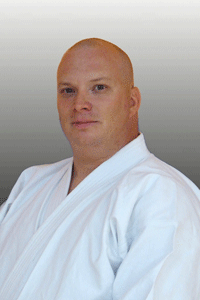
John S. Billie 1st Dan Head Instructor Old Town Karate Club |
| |||||||||||||||||||||||||||||||||||||||||||||||||||||||||||||||||||||||||||||||||||||||||||||||||||||||||||||

Rudolf Schwalda 2nd Dan Head Instructor |
| |||||||||||||||||||||||||||||||||||||||||||||||||||||||||||||||||||||||||||||||||||||||||||||||||||||||||||||
|
A SPECIAL "Congrats" to our newest black belts and our promoted black belts! Thank you for your dedication and hard work! Attention Instructors, if you have students who have been promoted, please send this information so that we may acknowledge their accomplishments. |
||||||||||||||||||||||||||||||||||||||||||||||||||||||||||||||||||||||||||||||||||||||||||||||||||||||||||||||
Guest Article
. . . |
West Virginia AKS Black Belt Testing 2018By Sandra Gore 3rd Dan AKS 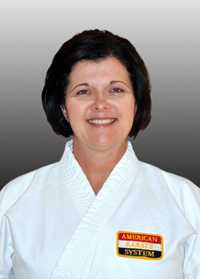
On May 24, 2018, 7 AKS members tested for their next rank. The testing was held at the Mountaineer Karate Club location at Jewel City Church, Meadowbrook, West Virginia. AKS Chief Instructor, Fred Reinecke 9th Dan, traveled to West Virginia to chair the testing board who consisted of John Folsom 8th Dan, Head Instructor at Salem Karate Club, Jude Gore 7th Dan, Head Instructor at Mountaineer Karate Club, Brian Greynolds 5th Dan, Mountaineer Karate Club, and Sandy Gore 3rd Dan, Asst. Instructor Mountaineer Karate Club. All candidates successfully demonstrated appropriate techniques and knowledge necessary for promotion over a 3-1/2 hour period. Candidates were from three West Virginia AKS schools, Mountaineer Karate Club, Meadowbrook, WV, Old Town Karate Club, Monongah, WV, and Salem Karate Club, Salem WV. Mountaineer Karate Club William Way, Assistant Instructor at Mountaineer Karate Club, received his 2nd Degree Black Belt. Bill was also the recipient of the West Virginia Student-of-the-Year Award in 2012. In addition to AKS basic requirements, Bill performed Bassai Dai, Kanku Dai, Nijushiho, Sochin, Bo Form 1, Nunchuck Form 1 and 2, and Sai Form 1. Dan Nawrocki, Asst. Instructor Mountaineer Karate Club, received his 1st Degree AKS Black Belt. Dan joined the Mountaineer Karate Club nearly two years ago, previously earning a Black Belt in Taekwondo. Dan's additional katas included Bassai Dai, Bo Form 1, and Nunchuck Form 1. Old Town Karate Club John Billie, Head Instructor of Old Town Karate Club and Asst. Instructor Mountaineer Karate Club, received his 2nd Degree Black Belt. John started Old Town Karate Club in April of 2017 in Monongah, West Virginia. His additional katas included Bassai Dai, Nijushiho, Kanku Dai, Gankanku, Bo Form 1, Nunchuck Form 1 and 2, and Sai Form 1. Kevin Bond, of Old Town Karate Club, received his 1st Degree Black Belt in the AKS. Kevin came to study with John approximately two years ago as a Brown Belt having previously studied Isshin Ryu, Jeet Kune Do and Shotokan. His additional katas included Kanku Dai, Bo Form 1, Nunchuck 1. Salem Karate Club James Wise, Asst. Instructor Salem Karate Club, received his 2nd Degree Black Belt. His additional katas included Bassai Dai, Kanku Dai, Bo Form 1, Nunchuck Form 1 and 2, and Sai Form 1. Jeffrey Merritt, Asst. Instructor Salem Karate Club, received his 2nd Degree Black Belt. His additional katas included Bassai Dai, Kanku Dai, Bo Form 1, Nunchuck Form 1 and 2, and Sai Form 1.
Don Riffle, Asst. Instructor Salem Karate Club, received his 2nd Degree Black Belt. Don was awarded the West Virginia Student-of-the-Year in 2009. He also studies Brazilian Jiu-jitsu and has added several of the ground techniques he has learned to the SKC curriculum. His additional katas included Bassai Dai, Kanku Dai, Bo Form 1, Nunchuck Form 1, and Sai Form 1.
The Candidates - left to right: The Candidates and Testing Board-left to right: |
|||||||||||||||||||||||||||||||||||||||||||||||||||||||||||||||||||||||||||||||||||||||||||||||||||||||||||||
The News
. . . |
A.K.S. News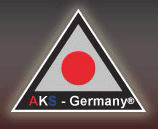
AKS-Germany Budo Meeting
|
|||||||||||||||||||||||||||||||||||||||||||||||||||||||||||||||||||||||||||||||||||||||||||||||||||||||||||||
The AKS Store
. . . |
AKS STORE - CLICK HERE!SUMMER is HERE! A perfect time to find that A.K.S. summer jacket or shirt to take you into summer with style. We have jackets, fleece, wind breakers, vests, shirts, sweatshirts, caps and more. There is also an embroidery service to have the AKS Logo / your name embroidered on your item. The perfect solution.
We would like to thank all those who have purchased AKS apparel through our on-line store. The AKS receives a portion of the purchase price on every item sold. We are a non-profit organization. Thank you for your continued support. Please visit our A.K.S. Online Store AKS STORE - CLICK HERE!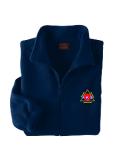
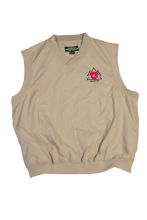
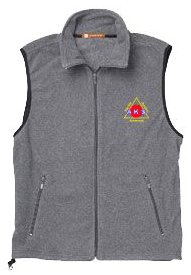
 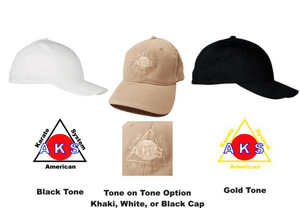
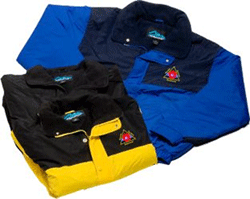
We are happy to announce we have upgraded the software to include FedEx online shipping rate calculation for International Sales. This makes it possible for us to take orders and ship to International customers. |
|||||||||||||||||||||||||||||||||||||||||||||||||||||||||||||||||||||||||||||||||||||||||||||||||||||||||||||
AKS Contact
. . . AKS Executive Board Fred Reinecke far.photo.fred@gmail.com ~ John Folsom (304) 782-3756 ~ Andrew Eckhart aeckhart77@gmail.com ~ Jude Gore jgore@citynet.net ~ AKS Executive Board Advisor Mike Sullenger kick2aks@yahoo.com |
Social Media
PLEASE VISIT US ON EITHER OF OUR A.K.S. FACEBOOK PAGES AT AKS Facebook Fan PageAKS Facebook GroupYou will need to have a FaceBook Login for the 'Group' link.AKS Web Addresses
Our "Official" web address is: www.aks-usa.com
|
|||||||||||||||||||||||||||||||||||||||||||||||||||||||||||||||||||||||||||||||||||||||||||||||||||||||||||||


Online Edition: 60 June 2018
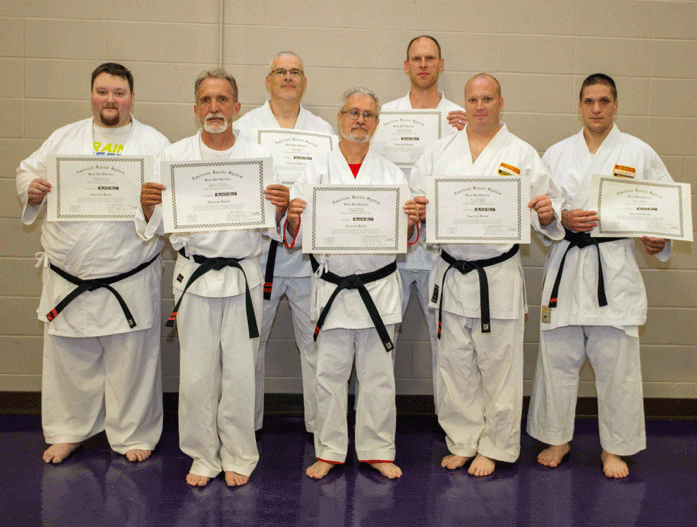
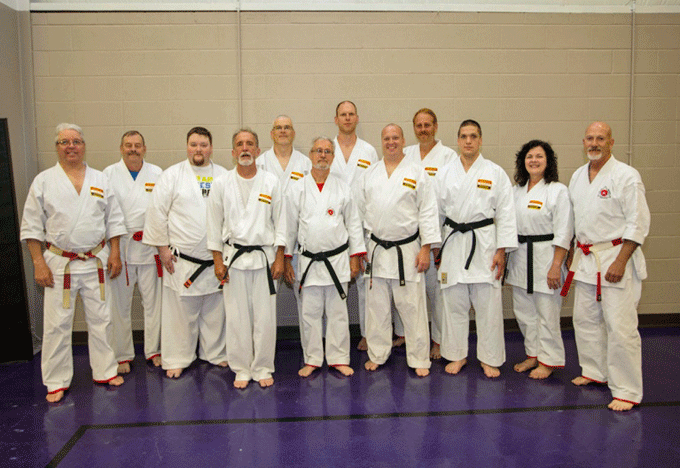
 C A M P 2 0 1 8
C A M P 2 0 1 8